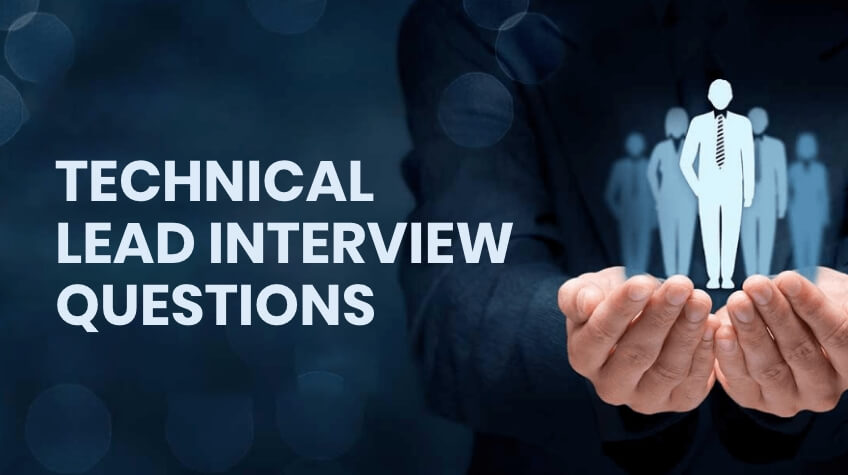
Technical lead interviews can be challenging, but knowing what to anticipate and prepare can help you keep calm and influence your interviewer! This article has compiled technical lead interview questions, so you’ll be ready for the questions and wow them with your answers.
1. Which programming language do you know?
Different companies have different requirements, so it’s important to know what they are asking and how you should answer. For example, some of the most common technical lead interview questions include:
- What is your favorite programming language?
- What is a data structure?
- Can you name a few algorithms?
Related Article: Top React JS Interview Questions and Answers: You Need to Know
Also Read: Top Node JS Interview Questions and Answers
2. Which is your favored programming language and why?
A common interpretation is that the interviewer would like to know which programming languages you have used extensively in the past and are most familiar with.
Regardless of the question’s intent, it is essential that you answer this question honestly, as it will help establish a relationship with your interviewer on an intellectual level.
I am familiar with Python and Ruby, but I’m also comfortable using Java, JavaScript, C++, and PHP.
Other Q&A: Top Python Interview Questions and Answers for Developer
3. Brief me regarding a triumphant undertaking you directed.
The interviewer is looking for an example of a project that you managed, that was successful, and that you can talk about. It’s essential to have an answer ready because it’ll show your potential employer that you’ve had experience in the past.
Think of a specific project you were in charge of or successfully led. Mention what you accomplished and how many people were involved with the process. You might also want to include challenges faced, how you overcame them and any notable lessons learned during the process.
4. What tools do you employ to examine the quality of code?
This an excellent question for any technical interview, this one may seem simple, but it’s pretty tricky. First, you should consider what makes a good developer and how they ensure high-quality code. A few possible solutions are looking at syntax, the documentation of the product, or testing with unit tests or some other type of test.
5. What are the first things you do when reviewing someone else’s code?
Programmers are always under much pressure and often have tight deadlines. That’s why they must know how to review someone else’s code.
The programmer should first ensure they understand the requirements, but then they should ask themselves: How does this design meet those requirements? They should then examine the code line by line and ask themselves: Is this line meeting what was requested? It is also crucial that the programmer has a systematic approach when things don’t go as planned or when there are bugs in the code.
Also See: Technical Lead Job Roles, Responsibilities and Salary
6. What is a linked list?
A linked list is a data format in which apiece component points to the next. This means it’s not a linear list where each piece is placed next to another but in a line. So if you have an array of 10 items, for example, the first item would point to the second item, and so on.
The last thing would relate to the first one, meaning they are connected with a pointer and form a Linked List.
The most commonly used list data structure is the Linked List because it’s easy to insert or remove nodes from anywhere in the list without affecting its overall integrity, unlike other lists like Queues or Trees.
Also Read: Data Analyst Interview Questions and Answers for Job
7. Why do you want a leadership position?
A leadership position is challenging but can be rewarding. A leadership position is a high-level management role where the person in charge has much responsibility for managing others, for example, overseeing the work of other technical leads to ensure that projects are completed on time.
When asked this question during an interview, consider what you would like to gain from the new job. For example, consider mentioning how you want more responsibility or how you want to be able to manage staff. You might also say how this position will allow you to grow and develop as a leader while continuing to do what you love—for example, leading technical projects.
8. What talents assist you be a productive technical lead?
The interviewer is considering someone who can come up with detailed solutions with negligible errors in judgment.
Other technical lead interview questions may include, what’s the best way to build trust with other team members? The interviewer uses these technical lead interview questions to evaluate whether or not potential candidates have what it takes to get projects done successfully. Technical leads must work hard, stay focused on deadlines, and maintain positive relationships.
9. How should I equip myself for my technical lead interview?
To prepare for a technical lead interview, you should do three main things beforehand:
- Conduct research about the company.
- Take time to read about the job requirements.
- Practice answering common technical leadership interview questions.
It would help if you also tried to network with anyone in the industry who might know people working at the companies where you’re interviewing so that they can pass along any insider tips they have.
10. How would you gauge your group’s execution?
With many teams, this question will be pretty straightforward. For example, if you are part of a minor, close-knit team working on projects with clearly defined goals, then it might be easy to say our performance is measured by how well we meet our goals and leave it at that.
But if you’re interviewing for a big company where the department’s success is not always evident (e.g., marketing), this question can be tougher to answer.
This is a tricky interview question that isn’t answered in one sentence. There are a few different ways you can answer this technical lead interview question, depending on what kind of team you’re in and what kind of environment it’s in.
For instance, if you work as part of a very large or international team – or even just a large group – there may be specific, measurable metrics involved with your work, or perhaps there is data from other teams that impact how your career goes over. Of course, it all relies on the company.
12. How would you inspire your team to reach their goals?
This is a vast query that could signify different things to different individuals. For example, the interviewer might ask how to motivate the team to meet deadlines, inspire the team to work hard or motivate the team in general. Relying on what they’re examining for, there are some other ways of responding to this query.
One way would be to talk about specific examples of when you’ve motivated your team in the past, such as encouraging them by giving them a pat on the back or trying extra hard yourself so that they will too. Another way would be to talk about what motivates you as an individual, which could give them insight into how to get others interested in their work too.
13. What is your ideal work environment?
This question is usually asked to gauge how well the person will do in a team environment. Think about what work environment would best suit your personality and skill set. Is it essential for you to collaborate with others, or are you most comfortable working independently? Do you need to be close to the office, or can long hours from home also work for you? And so on.
Technical leadership interview questions are asked for different purposes depending on the interviewer’s needs. Interviewers ask technical leadership questions to determine if a candidate meets requirements such as education level, experience, and ability to handle pressure. Technical leaders coordinate efforts between developers, engineers, testers, and management, develop schedules and budgets, and provide regular progress updates throughout the project.
Technical leadership interviews can be stressful because there may not be any pre-arranged responses or guidelines when answering these questions. Therefore, candidates should prepare by reviewing available resources that provide samples of technical lead interview questions and answer before they enter their first one.
14. What are your plans as a technical lead?
As a technical lead, it is essential to understand your plans for the future.
Here are some tips for answering this tricky interview question during an interview.
1) Think about what motivates you most in life. Maybe it’s creating innovative products or bringing people together to solve problems. Perhaps it’s making a difference in other people’s lives or solving challenging problems that no one has ever solved before, or maybe it’s something else entirely – but whatever is most important to you, make sure to mention it here!
2) It shows potential employers who you are as a person (i.e., where your passion lies), which can provide valuable insight into what type of employee they’re looking for (i.e., someone with an entrepreneurial streak vs. someone who likes being part of an established team).
15. What would you say are your greatest solidities?
In an interview, the interviewer will ask this question to determine how the applicant thinks about their skills. Be genuine but don’t be cold. Describe what makes you a suitable prospect for the job and be as straightforward as possible. After all, it’s true that every company needs technical leaders with different strengths.
16. What are some of my biggest strengths?
Some of my biggest strengths are having a good work ethic, being detail-oriented, having excellent customer service skills, being able to follow directions well, and taking in much information quickly; I am very motivated by success.
17. What would you do if there was a conflict between your group associates?
If there is disagreement, most people try to solve the problem together. It might also be best for you to provide a solution for them; both team members need to accept that idea. If someone is unwilling to cooperate in this situation, it might be best to move on from the company or change their mind about their original disagreement.
18. What is the foremost work you would like to do as the technical lead at our establishment?
A few things need to be discussed to resolve this query. A few things need to be addressed to resolve this query. First, What does this company do? And what does the role of a technical lead entail? The interviewee should be prepared to answer these before anything else. If the interviewee can’t respond adequately, they will not have an easy time getting through this process.
As the technical lead in many organizations, it’s expected that some leadership level will be required. Often (but not always), part of being a technical lead means supervising or managing other employees or managers with direct reports. However, technical tips usually report directly to someone higher up in their organization, such as the CEO or CTO, so they don’t typically have direct reports.
19. What is one common trait you think makes for successful technical leads?
Many features make for successful technical tips, but it’s tough to answer this question without knowing what type of position you’re interviewing for specifically.
20. How would your earlier employer define you?
The most suitable way to answer this is with various truths, stats, and retellings. Points might include the scope of projects accomplished on time or budget under their supervision; stats would be how many people reported directly to them during their tenure at the company and anecdotes about team meetings or what they did after work hours.
Be sure not to boast too much about yourself, however! If any accomplishments from previous positions are relevant, don’t hesitate to mention them. But make sure they’re relevant because nothing will turn off an interviewer more than bragging about things that don’t matter.
21. What leadership style do you have?
There are three leadership styles- directive, consultative, and participatory. A leader who uses a directive style uses commands as opposed to advice; one who is consultative offers advice rather than controls; while a participatory leader facilitates decisions without being authoritative (leadership can take different forms depending on the situation). Think carefully about which leadership style fits your personality best to tailor your responses accordingly.
22. When did you last make a mistake?
One day, I tried to go through my usual morning routine by checking emails before brushing my teeth-needless to say, it was disgusting!
23. Why do you like to work for our establishment?
This is an excellent way for candidates to demonstrate their knowledge about the company and get insight into how much research was done before applying for a position. While there are no right or wrong answers when asked this question, it’s essential to be honest so that interviewers know that you did some research before coming in.
If you’ve researched the company extensively, tell them so! If not, don’t lie but try to convey interest by saying something like I am interested in this company because I read on your website that you offer competitive salaries.
24. How do you deal with burnout?
In an interview setting, this question generally means, how do you avoid being bored or unmotivated in your current position?
First, try to be specific and demonstrate that you have plenty of interests outside of work. If that doesn’t work, then mention how much autonomy or control over the work process you have.
Then, if neither of those alternatives works, talk about how much responsibility you give at work. It’s important to note that sometimes the interviewer might not ask you a yes or no question but will instead ask what your typical response would be.
25. Describe why you’re the best choice for the job.
This is a difficult question, as it requires the candidate to identify their strengths in a way that the interviewer can’t find on the resume. The key to answering this question is to consider what separates you from other candidates and how your skills will benefit this specific position; the candidate must do their research on the company before going into an interview. It’s not enough for a candidate to answer with I’m organized.
In answering this question, it’s essential that you are prepared with examples of how your skills will make you the best fit for this position. For example, if you have extensive experience in customer service but little knowledge of software development, then don’t say that customer service experience makes you the best person for this job.
Conclusion
Do you want the inside scoop on technical lead interview questions? Your job may depend on it. Read this article for technical lead interview questions and answers to the best technical leadership qualities determined by recruiters. Please don’t get caught off guard by that tricky question during a vital interview when it turns out there’s an answer all conveniently available in this helpful article. Please take a few minutes to read our article so you can deliver polished responses confidently tomorrow at the technical leadership job interview before the competition improves you.

![15 Appium Interview Questions and Answers for Freshers [2025] 15 Appium Interview Questions and Answers for Freshers [2025]](https://www.weetechsolution.com/wp-content/uploads/2024/09/Appium-Interview-Questions-and-Answers-for-Freshers-300x150.jpg)
![25 Interview Questions and Answers for UI UX Designer [2025] 25 Interview Questions and Answers for UI UX Designer [2025]](https://www.weetechsolution.com/wp-content/uploads/2023/06/25-UI-UX-Designer-Job-Interview-Common-Questions-and-Answers-300x150.jpg)



